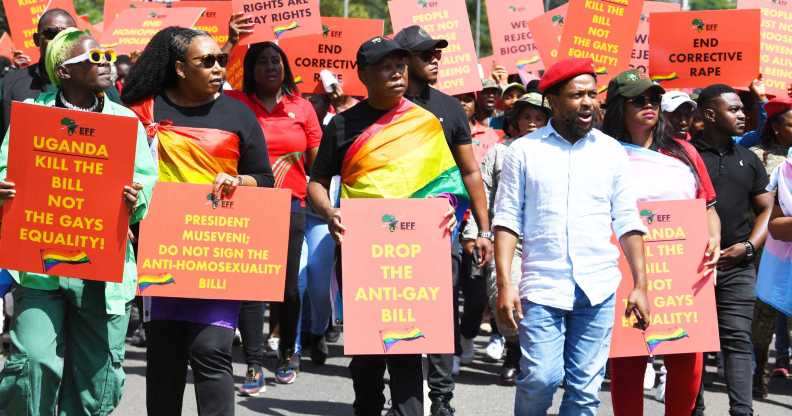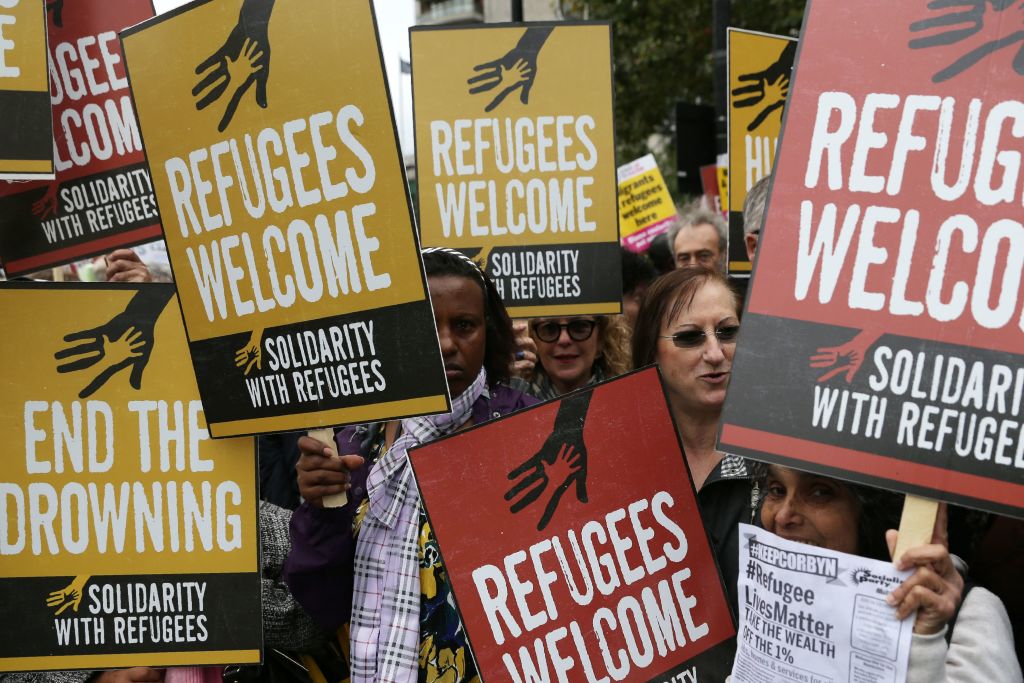‘Sharp increase’ in LGBTQ+ Ugandans trying to flee country after Anti-Homosexuality Bill

Asylum charity records a sharp increase in LGBTQ+ people from Uganda asking for help in fleeing the country. (Frennie Shivambu/Gallo Images via Getty Images)
A global LGBTQ+ asylum charity has recorded a huge rise in LGBTQ+ people from Uganda asking for help in fleeing the country.
Rainbow Railroad says the rise is “directly related” to the Anti-Homosexuality Bill, which doubles down on the criminalisation of same-sex activity while introducing a new crime of “aggravated homosexuality”. Defined as sex with a minor, having sex while HIV positive or incest, it carries a death sentence.
The bill originally made it illegal to simply identify as LGBTQ+, but this clause was removed as parliament reconsidered the bill this week.
Rainbow Railroad has received more than 468 requests for help from LGBTQ+ Ugandans in 2023 so far. That represents a “sharp increase from previous years”, the organisation told PinkNews.
Speaking to PinkNews, Kimahli Powell, executive director of Rainbow Railroad, said: “There were already disturbing signs that Uganda was targeting the LGBTQI+ community before the bill was introduced, including the shutdown of civil society organisations like Sexual Minorities Uganda – but the spike is directly related to the bill’s passage.”

Notably, 56 per cent of those seeking assistance are trans or non-binary.
This points to a “larger backlash and targeting of trans persons” by the “anti-gender movement”, Powell says.
“We’re deeply concerned around the vulnerability of trans people who will be severely persecuted if and when this bill is signed into law,” he added.
Swift action is necessary, Powell says. He is urging governments around the world to do what they can to provide support to LGBTQ+ Ugandans who are forced to flee.
“We need governments to co-operate with us. We’ve been having multiple conversations with governments to think of a proactive response plan that will allow us to refer people to safety.”
‘Humanitarian crisis’ will follow Uganda’s anti-LGBTQ+ bill
Rainbow Railroad’s efforts are complicated by measures by some governments to deter people from seeking asylum in their countries.
The UK government has faced condemnation over its Illegal Migration Bill, which would see asylum seekers who arrive by unapproved routes deported to Rwanda or a third country, while the Biden administration rolled out new asylum restrictions in February.

“We are obviously concerned with legislation that will restrict the right to asylum like we’ve seen in the UK and even in the US – the Biden administration’s policies on asylum are concerning,” Powell says.
“The thing to stress is governments around the world have spoken vehemently and clearly against the [Uganda] bill. They understand the risks, and they’ve been doing everything in their power to prevent the president from signing.
“However, governments need to also understand that if the bill becomes law there is a humanitarian crisis that demands a response.
“UNHCR predicts that the number of forcibly displaced people will rise to 110 million by the end of this year and so governments need to act. Uganda is a clear opportunity to partner with Rainbow Railroad to ensure that folks who need to flee can do so safely.”
Uganda has been seen as a particularly hostile environment for LGBTQ+ people for some time. Homosexuality is already criminalised in the East African nation, but that hasn’t stopped the government from passing legislation that became known as the ‘Kill the Gays’ bill in 2014.
While that act was struck down, LGBTQ+ people continued to face persecution and hostility in Uganda.
There was international outcry when the Ugandan government introduced the Anti-Homosexuality Bill, a new version of the 2014 law, in March.
Activists have warned that the bill could jeopardise the safety and wellbeing of LGBTQ+ Ugandans if it is signed into law.
Frank Mugisha, executive director of Sexual Minorities Uganda, told PinkNews that it could trigger a “genocide” and that the legislation has caused “a lot of fear” in the LGBTQ+ community.
How did this story make you feel?

